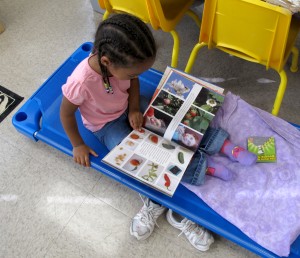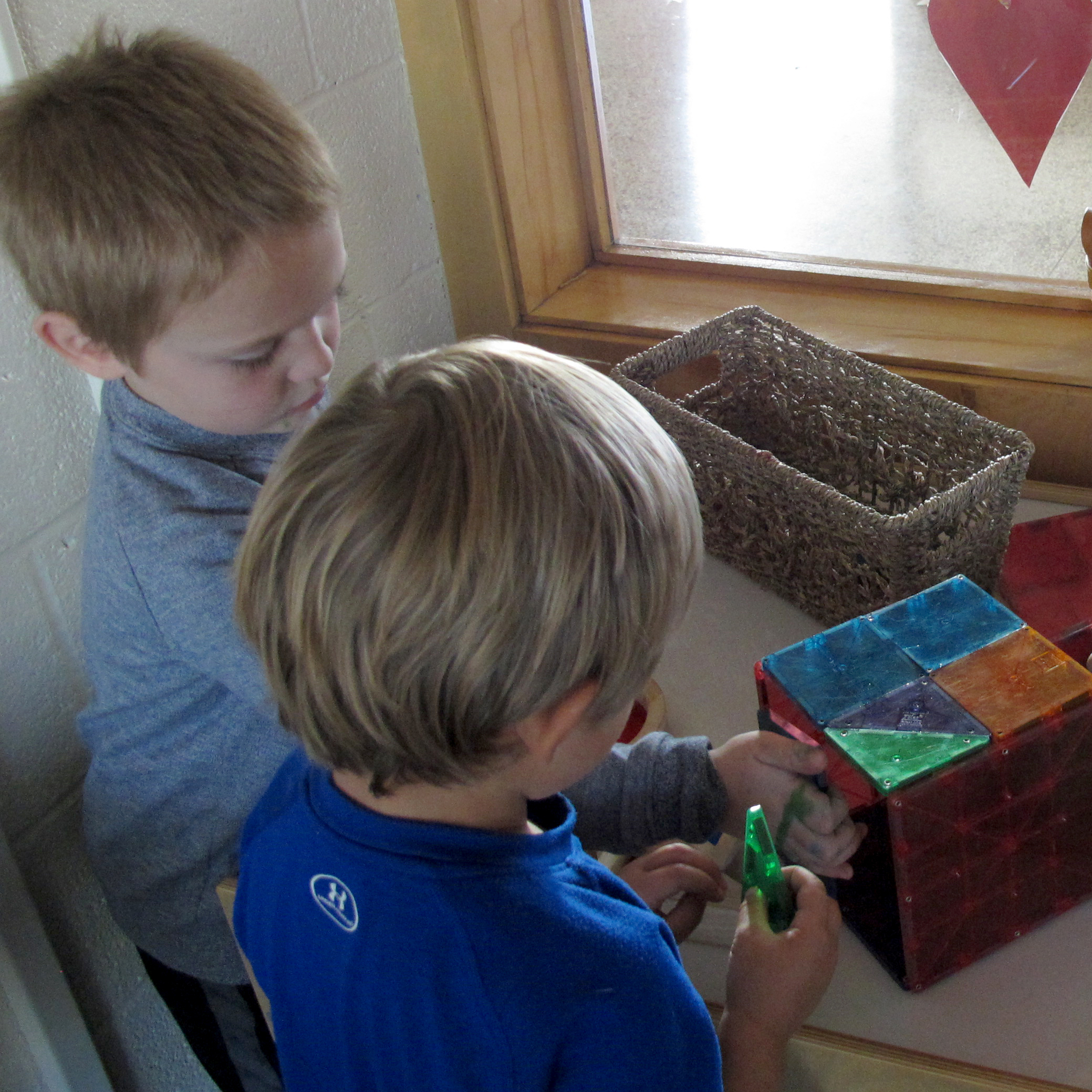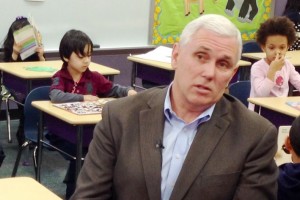Indiana Will Pay For Pre-K, But Questions About Cost & Quality Remain

Elle Moxley / StateImpact Indiana
A student looks through a book about fruit and flowers at Busy Bees Academy, a publicly-funded preschool in Columbus.
Walk through the halls of Busy Bees Academy, a publicly-funded preschool in Columbus, and director Cathne Holliday says you’ll notice something different
“Everyone has a stake in each child’s education,” she says.
Teachers here are charged with preparing each of the school’s 115 4-year-olds for kindergarten.
“We’re also just giving them a foundation for learning,” says Holliday.
Indiana used to be one of 10 states that didn’t provide any state dollars for preschool — and public programs like Busy Bees were the exception, not the rule. But that’s about to change as Gov. Mike Pence is expected to sign legislation that creates a small-scale voucher-style pre-K program for low-income Hoosier kids.
- Indiana Joins Majority Of States With Pre-K FundingAs StateImpact Indiana‘s Sara Wittmeyer reports, early childhood education advocates say a preschool pilot program is just the first step.Download
The Case For State-Funded Preschool
Ninety percent of a child’s brain is developed by the time they turn five.
“We know we have a large group of children enter the kindergarten doors, and they’re already a year or two behind in their development,” says Michael Conn-Powers, director of the Early Childhood Center at the Indiana Institute on Disability and Community.

Gretchen Frazee / IPBS
Michael Conn-Powers directs the Early Childhood Center at the Indiana Institute on Disability and Community.
Conn-Powers has written numerous policy briefs about pre-K education.
“And even with the best kindergarten teacher its hard to catch up,” he says. “Kindergarten has changed so much because they have strong educational outcomes they have to be meeting. They don’t have time and the luxury to slowly ease all children into formal schooling. So once behind, then the likelihood is they’ll always be behind.”
According to the most recent census, only about 40 percent of Hoosier 3 and 4 year olds get any preschool. Even fewer attend high quality programs.
In A Non-Budget Year, Battle For Funding Is Tough
Pence made finding money for pre-K his No. 1 education priority this session.
His proposal seemed doomed to fail — early childhood education is expensive, and lawmakers had just shelled out for all-day kindergarten. The proposal that passed the House was scaled back when it reached the more cautious and fiscally conservative Senate.
Then, in the waning days of the session, lawmakers revived it. But they put the onus on the governor to come up with the money to pay for it, a difficult proposition given that state revenues are down.It didn’t take long for Pence to identify $10 million within the Family and Social Services Administration’s existing budget.
“I’m very confident that even in this difficult and uncertain economy that we are managing the state resources in a prudent way and in a manner that is going to preserve our budget surplus as well as our budget reserves and meet the obligations of our programs around the state,” Pence said during a post-legislative session press conference.
Pence hasn’t released specifics on how the program will be funded to the public. He says the cuts won’t mean any reduction in services. And at least 10 percent of the money for the pilot is supposed to come from private donations or federal dollars. That could add up to $5 million.
Why Ensuring Quality Will Be Key To Pilot’s Success
There’s no cap on the number of students who can be in the pre-K pilot: It’s limited only by the amount of money available.
Lawmakers tasked FSSA with coming up with five counties to participate in the program. Eligible families can make up to about 127 percent of the federal poverty level, or about $30,000 for a family of four.
The amount of the awards will vary from $2,500 to 6,800.
“Yes, it would be nice if more children and families could benefit, but beggars can’t be choosers,” Conn-Powers told StateImpact. “We need to start somewhere and waiting for everybody to be served — that could take a long time.”
Kids can go to top-rated childcare centers on the state’s Paths to Quality scale — that is, Levels 3 and 4. But pre-K researchers are skeptical some of those programs won’t be high quality enough to make a difference in the education of the very low-income children the pilot targets.
A study Conn-Powers conducted found some Level 3 programs weren’t particularly strong.
“They weren’t any better than folks that were not participating in the Paths to Quality,” he says.
Research across the country generally finds that quality rating systems aren’t always aligned with education quality, says Conn-Powers.
State Will Proceed With Caution Before Expanding Pilot
The pilot also includes up to $1 million for a study that will follow the kids in the program through the third grade.
“It’s the Indiana way,” says Pence. “As we get started, we put our money where our hearts are, and then we deliberate. We consider and we’re careful — so I don’t want to presuppose the decisions of future legislatures will be in this regard.”
“What I can pledge is we’re going to move expeditiously to provide these resources to disadvantaged kids and then we’re going to very carefully consider the best way forward in serving the interest of Hoosier kids in the long run.”
Pence says the study will give lawmakers data on the impact the pilot had that they can then use to determine how to best expand pre-K.
Podcast: Play in new window | Download



